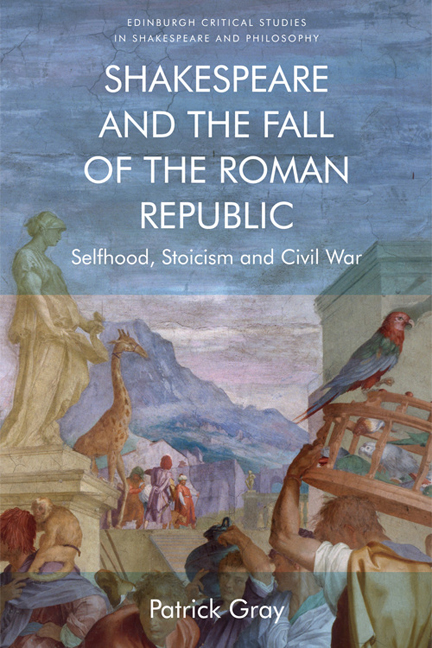1 - ‘A Beast without a Heart’: Pietas and Pity in Julius Caesar
Summary
In Julius Caesar, Brutus is a deeply attractive character, not only to his wife, Portia, and his friend, Cassius, but even to his murder victim, Caesar, as well as his chief rival, Antony. What makes Brutus so appealing, however, is a quality which he himself sees as a moral vice, empathy, including in this case a sense of civic duty. Despite his initial misgivings, Brutus backslides into political engagement: Cassius lures him away from Senecan philosophical isolation into an obsolescent Ciceronian enthusiasm for service to the state. Brutus’ kind-heartedness is political, as well as ethical, finding expression in a sense of noblesse oblige. He tries to withdraw from public affairs and ‘live unknown’ like an Epicurean philosopher, but he has too keen a sense of his responsibilities or what Cicero might call his officia (‘roles, obligations’) as a husband, friend and patriot; he cannot shake his old-fashioned pietas (‘duty, reverence’).
Even more striking, given his ostensible Stoicism, is Brutus’ tendency, like Coriolanus, to give way to compassion. Pity is an emotion which they both see, like Seneca, as an embarrassing and distracting weakness. As Russell Hillier observes, ‘The natural pity Martius finds within himself for his family and his people when he capitulates to the claims of “Great Nature” (5.3.33) shames him in the eyes of the Romans and the Volscians.’ Like Coriolanus, Brutus finds to his chagrin that his strenuous efforts to maintain a sense of command over his inner life repeatedly break down. When he sees that he has hurt his friend, Cassius, or his wife, Portia, he yields, like a Christian, to a humane and generous desire to comfort them in their distress. This unbidden empathy, like his decision to engage in politics, is incompatible with his chosen ‘philosophy’ (4.3.143). His own ideal self is not the one which Antony describes, the Republican hero, animated by concern for the ‘common good’ (5.5.72), but instead the quasimythical figure of the Stoic sapiens, distinguished by his superhuman detachment from the world at large.
In sum, Shakespeare depicts Brutus as torn between two opposed visions of heroism: Stoic and proto-Christian. He aims to become an exemplary Stoic sage. But he fails to remain indifferent to the imminent collapse of the Roman Republic. He cannot bring himself to alienate his own wife, Portia, or his friend, Cassius.
- Type
- Chapter
- Information
- Shakespeare and the Fall of the Roman RepublicSelfhood, Stoicism and Civil War, pp. 49 - 94Publisher: Edinburgh University PressPrint publication year: 2018

